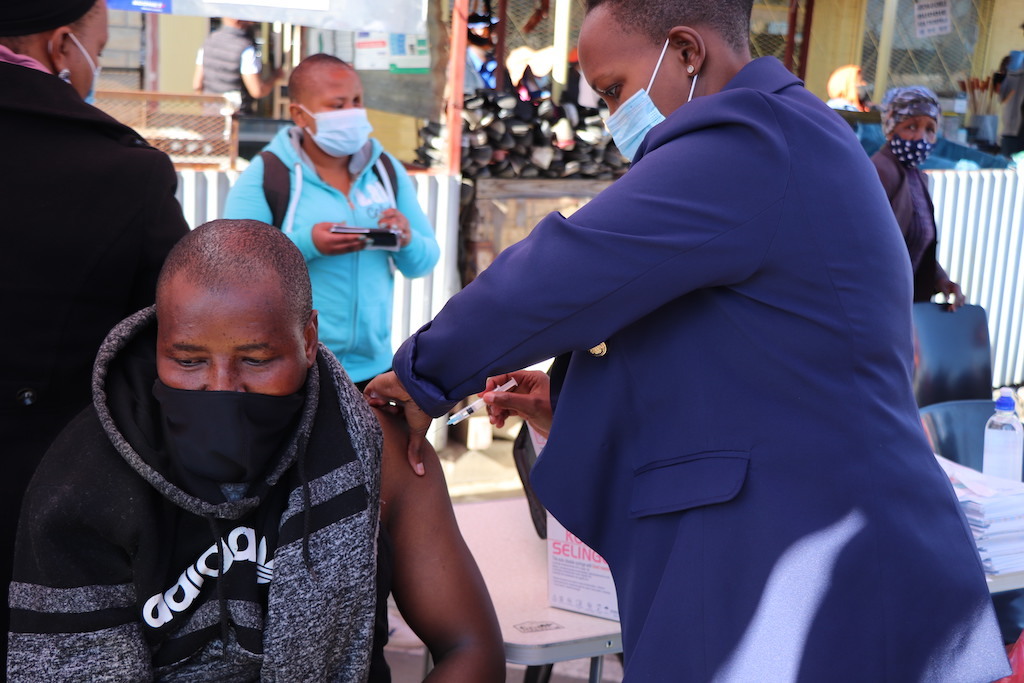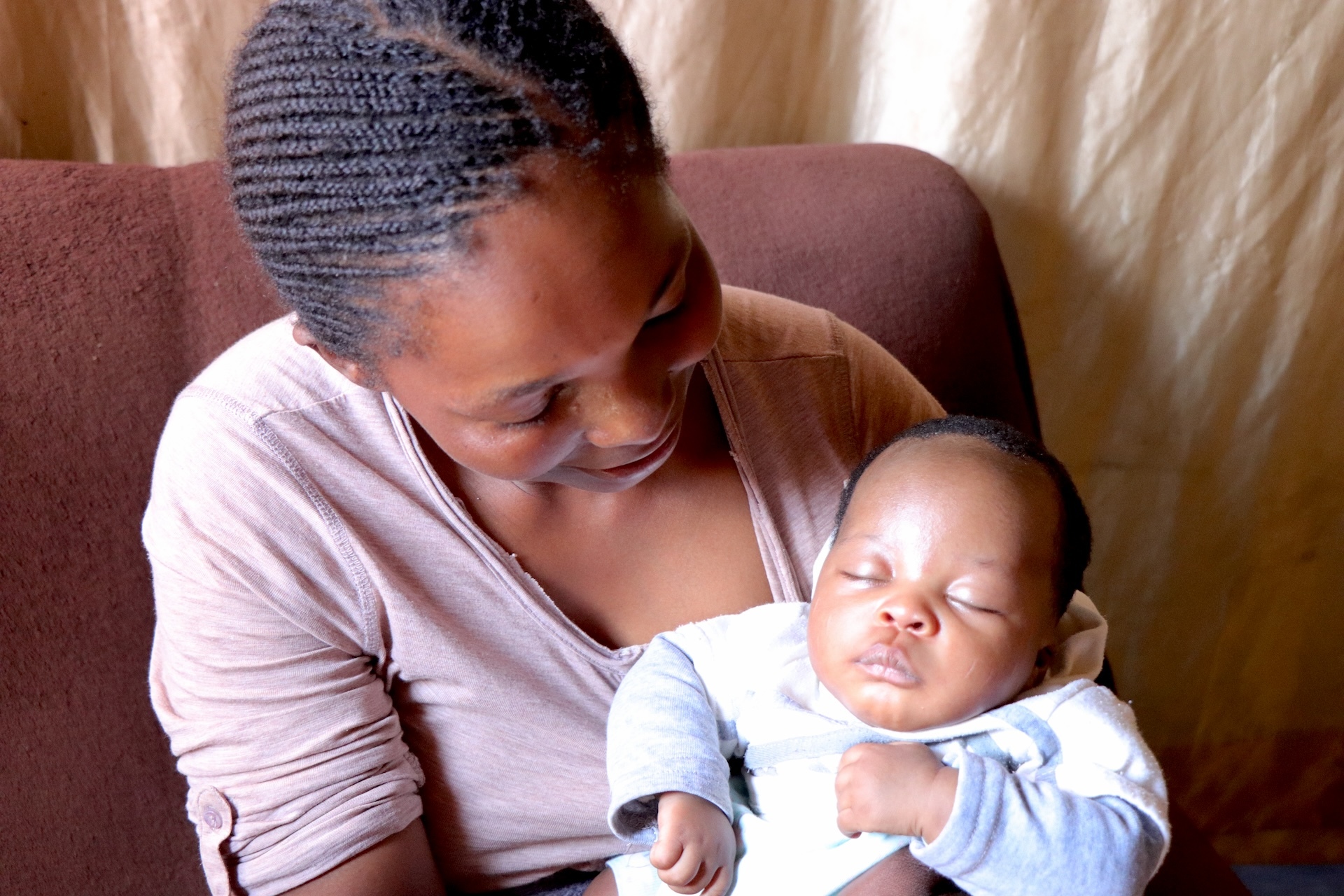Lesotho, with a population of just over 2 million, was one of the last countries in Africa to report a COVID-19 case, but its high HIV prevalence rate of 23% makes COVID-19 a particular concern—since HIV, if not effectively treated, can compromise the immune system, leaving people especially vulnerable to severe illness. However, if HIV is effectively treated, people living with HIV face similar health outcomes when facing COVID-19 as those without HIV.
Herein lay the challenge—some public health measures aimed at reducing COVID-19 transmission make it more difficult for people living with HIV to access the quality treatment they need to stay healthy.
“There were a lot of fears and uncertainty on the impact that the lockdowns were going to have towards retention of people living with HIV in care and treatment, as this is one of the biggest challenges that we are facing as a country and program,” says Putsaletso Maja, M.D., director of EGPAF’s HIV program.1 “During hard lockdowns, people needed to get authorized permits for movements or show their medical booklet (bukana) to law enforcement agents if seek medical attention, which [violated] patient’s confidentiality.”
HIV Programs Prepared Lesotho for COVID-19

After 18 years of experience fighting HIV in Lesotho, EGPAF staff like Dr. Maja found themselves on the front lines as the COVID-19 pandemic reached the Basotho people. Each wave of COVID-19 brought new urgent challenges. Having supported the Ministry of Health in strengthening the health system across the country, EGPAF staff already had strong experience and the tools necessary to combat viral infections.
As the pandemic spread, EGPAF-sponsored clinical nurses were assigned to gather samples from individuals and have them transported to a lab for COVID-19 testing. Later the Ministry of Health introduced a rapid COVID-19 test whereby the samples of those who tested positive are taken to a lab for a confirmatory test.
EGPAF has also worked to reduce the spread of the virus—with active representation on the national COVID-19 technical working groups—helping to develop a national emergency response that includes infection-prevention and control at points of entry such as borders and airports. The working group also worked on risk communication and community engagement strategies.
“The availability and roll out of COVID-19 vaccination brought hope to the country that the restrictions imposed during hard lockdown were lifted due to the vaccination coverage within the country.”
The next great barrier was vaccine access. EGPAF supported the Ministry of Health with vaccination roll-out by engaging additional vaccination nurses and records assistants to capture data. The vaccination campaign was launched by King Letsie III immediately after the arrival of the first batch in March 2021, and the COVID booster vaccine was launched a year later.
“The availability and roll out of COVID-19 vaccination brought hope to the country that the restrictions imposed during hard lockdown were lifted due to the vaccination coverage within the country,” says Dr. Maja. “Since the vaccination roll out, the country has not experienced the hard lockdowns again, which has allowed smooth continuity of health services.”
“COVID Is Here to Stay”
“Currently the staff and the public at large seem to have adapted to the COVID-19 safety measures as their new norm,” Dr. Maja says. “Everyone is taking precautionary measures as they continue with their normal business. I feel COVID-19 is here to stay, and we have to accommodate it as part of our day-to-day life—and in the health facilities effectively integrate it within the TB program towards screening and Extended Program of Immunization.”
Remaining barriers to epidemic control are more nuanced than vaccine availability.
“The next challenge was data capturing, and fortunately EGPAF was supported by the U.S. President’s Emergency Plan for AIDS Relief (PEPFAR) to procure 100 electronic tablets to donate to the Lesotho Ministry of Health to capture COVID-19 data at all EGPAF supported vaccination points,” says Dr. Maja.

The Current Challenge: Vaccine Hesitancy
“Now, the major challenge that the country faces in fighting COVID-19 is vaccine hesitancy especially among adolescents and men,” Dr. Maja says. Rumors and misinformation about the vaccine are rampant. Coupled with the reduction of anxiety, fears, and uncertainties, the waning urgency and interest in vaccination are a major barrier to reaching critical mass of vaccinated people. Reaching that critical mass is the key to guarding the safety of those who cannot yet become vaccinated safely (such as infants) or those with compromised immune systems, such as people living with HIV.

“Ultimately, what remains is to strengthen advocacy to our people to increase vaccine uptake in order to reach WHO targets of at least reaching 70% of the population,” says Dr. Maja.
“At the moment we have enough vaccine for all and even for booster shots. Our donor PEPFAR also provided additional funding to integrate COVID in our existing HIV and TB program. Despite the availability of the vaccine in the country, the uptake is still low.”
What remains is a gap in education, and EGPAF is working with Ministry of Health and other implementing partners on health literacy efforts to cultivate an informed, empowered, and proactive public. In July 2022, EGPAF launched a public information campaign across social media, radio, and print media to empower the public with accurate and clear COVID vaccination health information and ensure they make informed decisions and adopt health seeking behavior. Through this public information campaign—especially social media and phone-in radio programs—EGPAF is able to engage the public. Some are asking about their nearest vaccination points, others share testimonies of getting vaccinated, still others wonder if the vaccine is safe. And some share important feedback to improve vaccine access and reach a wider population.
“Ultimately, what remains is to strengthen advocacy to our people to increase vaccine uptake in order to reach WHO targets of at least reaching 70% of the population.”
“The public education campaign helps us not only to address false information and give them facts but also it is a good platform to get community feedback about COVID vaccination with a view to improve service delivery and ensure access,” says Dr Maja.
As of August 13 2022, The World Health Organization (WHO) has reported 34,285 confirmed cases of COVID-19 in Lesotho since January 2020, with 704 COVID-related deaths.




